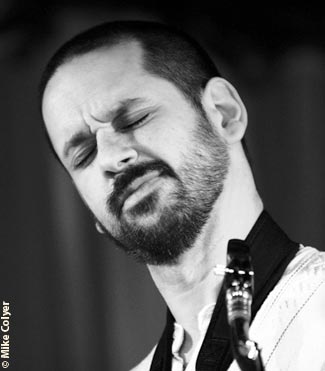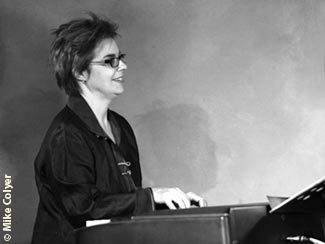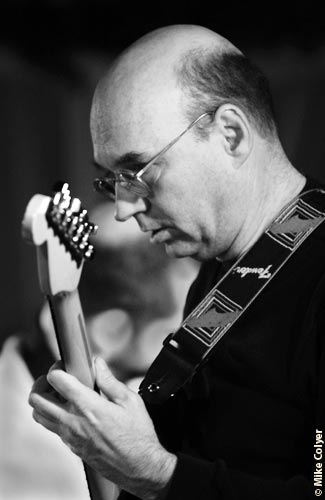|
“Lullaby for Oscar”, also from Seadance, was next — included at that point “because there’s a better chance you won’t fall asleep in the first set.” There was no word at press time as to whether the young lad in the front section for whom Padron wrote the song was soothed to sleep; as Padron offered up a lullaby of impressively authoritative mid- and low-range tones. Here, the abilities of bassist Andrew Downing and keyboardist Marilyn Lerner to change pace and pitch also shone. Clad in shades with spiked hair, Lerner has a stylishly quirky vibe that is a joy to watch in the context of her textured playing that could seemingly go in just about any direction genre-wise.
We were then introduced to La Juana. She was the caregiver for Padron’s family who had come to Canada with them and then moved back. Padron described the album as a celebration of the Canadian experience through the lens of an inspirational visit with her. The song was a microcosm of Padron himself, cosmopolitan yet folksy. Mark Duggan’s four-mallet marimba solo was entrancing, his work and place in the band as its rhythmic foundation becoming more apparent from that point forward. As a composer, Padron is adept at revealing his musicians’ individual strengths and personalities, fostering relationships between players, and the band’s sound as a whole — giving the audience the opportunity to enjoy all of these dynamics.
Duggan’s marimba introduced “Waiku”, with Downing next to join the fray followed by a short sax blast, before a coda to the intro marimba beat. Hetherington entered with some feathery drums, and then Padron took over for with a blistering sax solo that again revealed out his formidable mid- and low-range tones. Appropriately, given its name, which means “people of the moon”, the song returned to a tropical trance, almost dub-like groove, with Lerner’s keyboard subtly climbing the ladder.
“El Araguenay” was a tribute to Venezuela’s national tree, famous for its explosion into yellow bloom during the end of dry season. Sure enough, the song exploded into bloom from a relaxed intro, with some show-stealing marimba from Duggan at its apex.
“Still Unheard” is Padron’s sonic homage to the disenfranchised indigenous people of his homeland. Starting with the rhythmic one-two of the marimba, a haunting accordion melody, and a beautifully-articulated soprano sax line, one could hear the plight of these people symbolized in song — seemingly ready to break out from the sadness yet never quite realizing their true freedom.
Padron revealed yet another side to his rich musical palette in the form of “El Jabillo”, a captivating, odd-metered Afro-Cuban composition. This was for the free-jazz lovers in the house, the lines reminiscent of Miles Davis’ electric years with acid jazz/rock guitar, gypsy-esque accordion and Padron’s vibrato sax walking a melodic tightrope. The rhythmic synergy of bass, drums and congas was equally impressive.
|
|

Bernardo Padron |
|

Marilyn Lerner |
|

Ted Quinlan |
|





